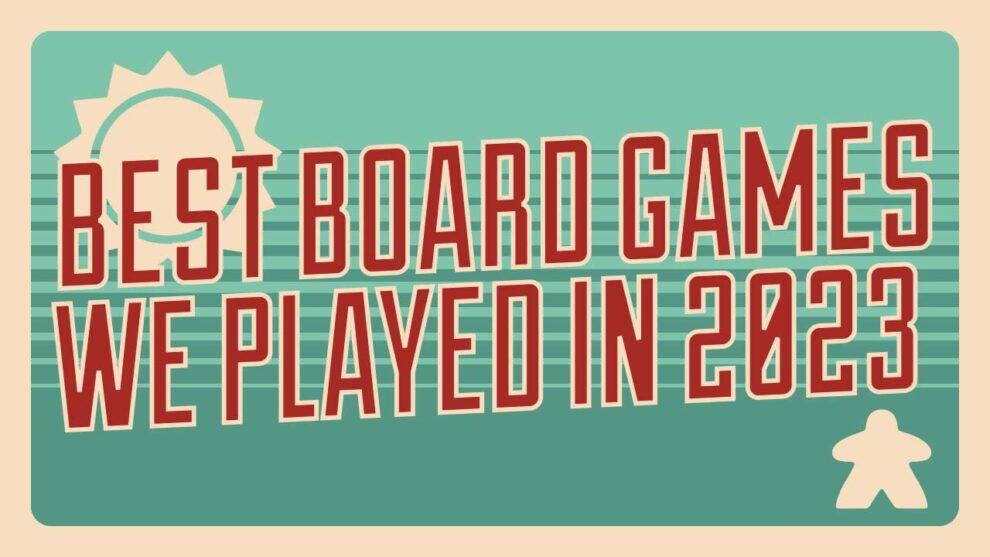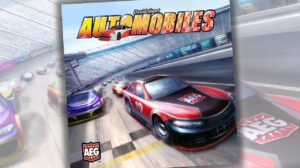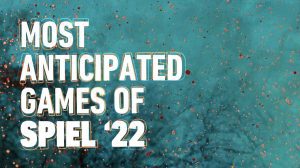We play a lot of games here at Meeple Mountain. Some of them are brand new, not even on shelves yet, and some of them are classics. But no matter who’s playing, or what, we all have our favorites. Here’s a list of the best games we played this year, including a few games that might surprise you…and no, they’re not all from 2023!
Root
Andy Matthews
Last year I joined a gaming group which skewed towards heavier games. This allowed me to indulge myself with games I might not normally play with my other groups…games like Root. This is a “battle royale”, set in a forest, where the players are cute and fuzzy creatures like birds, cats, mice, rabbits, and raccoons. And Leder Games has added many more factions like otters, badgers, moles, rats, and even lizards.
You might say 2023 was the year I went all in on Root. Thanks to a great group and amazing and varied games, I decided to pick up all the expansions. Root is such a satisfying challenge because no two gaming sessions are ever quite the same. While everyone plays within the same basic framework, each faction has their own unique play style and win conditions. This rewards people who play Root more often. But because factions are rated by difficulty, it means first-time players can still step in and do well when playing against a more complex faction. Root might be one of the best and most unique games I’ve ever played, and thanks to the commitment from Leder Games, it will hopefully only keep getting better.
Read our review of Root digital.
Hegemony: Lead Your Class to Victory
Justin Bell
I had the opportunity to play more than 200 unique titles in 2023, but this pick was relatively easy. Hegemony was the best game I played this year because it featured, far and away, the most yelling.
I say that in a loving way. Hegemony, which plays best at its full player count of four players, lets players take on the roles of the Working Class, the Middle Class, the Capitalist Class, and the State. Each player is playing a different version of the same game, hinged to an incredible hand management system that features tough choices, balanced scoring opportunities, and lots of negotiation. As much fun as the overall game is, nothing beats the Elections Phase, when each player gets to make their case for why they want votes to go a certain way. In the right groups, Hegemony is such a rich and interactive experience. For one of my plays, everyone wore costumes representing their faction. I’m confident that has never happened in my time developing content for Meeple Mountain!
I had the pleasure of playing Hegemony six times, including four times at the full player count. Hegemony is a keeper, and there’s a reason why so many of our peers think this was the best game they played in 2023. For one of the game’s two co-designers, Hegemony is their first published design; an incredible accomplishment. I’m already excited for this design team’s next project, World Order.
Daybreak
Arthur Franz IV
Can you make a game out of the end of the world? Matt Leacock has done it twice now. Daybreak is a cooperative game released in 2023 where you try to prevent climate change. With a game premise that could be bleak and foreboding, the designers have built a bright and optimistic game about how to stave off the looming catastrophe.
I appreciate how daunting the task is at the outset. We lost our first game pretty decisively. But the manner in which Daybreak gamifies what it would really take to reverse the warming trend educates players on how they can take action while also presenting a fabulous engine builder optimization puzzle. The game showcases how global collaboration could solve the crisis.
I have played Daybreak 10 times in the past 2 months. Though it is a middleweight game that plays in under an hour, it packs a lot of good crunch into the early engine building stage. The replayability is high due to the volume of local project cards, crisis cards, and global project cards available. Your path to capturing carbon and achieving “draw down” to reverse the warming trend is never identical but the task is straightforward and, most encouragingly, attainable. Go save the world!
Horseless Carriage
Thomas Wells
It’s a damned masterpiece. Equally accessible and esoteric, with a frantic pace that matches the feeling of bringing an ungodly technology to life. Unlike nearly every one of Splotter’s other games, this one gives begrudging consent to allow everyone to have a good time, even if they’re not doing well. The puzzle, while appearing fiddly and complex, is actually more about speculating on a technology that nobody has truly invented yet, and is paired with shifting sand of market expectations. It punches with kid gloves with glass embedded in the knuckles and we’re all the better for it. I cannot think of the last time I enjoyed the rhythm of a game so much–it feels MYTHIC. Plus, SPACE AS A RESOURCE!
It’s unfortunate that the game has received a lukewarm response. Often, gamers prioritize “figuring out” a game and pigeonholing it over deep engagement with a work of art–which makes sense, the never-ending tide of new releases rewards this. That said, there’s a great series of strategy articles on BGG that dive into the nuances of the game, and my prediction is that newcomer artist Jan Lipiński is going to be a force to be reckoned with in board game art and graphic design. Don’t let the bland pictures convince you otherwise, he made a powerful bit of art and graphic design here.
Read our review of Horseless Carriage.
My Father’s Work
Tom Franklin
Combine a worker placement game with a narrative overlay where your decisions change your environment and the resources available and you have My Father’s Work. With a top-notch production, including Game Trayz for all the components (and what wonderful components they are!) this has made for some great game nights.
The game comes with a bound set of numbered maps that will change during the game, as well as three separate storylines. Each story has its own box of components that may or may not come into play, based on your group’s decisions during the game.
Just how good is My Father’s Work? Each game we played took close to three hours, and at the end of each game, we all agreed we wanted to play it again the following week. Then, after we’d played through all three scenarios, we wanted to play all three again to see what different decisions would lead to. (So we did.)
Of all the games I’ve played in 2023, My Father’s Work is the one I’m most looking forward to revisiting in 2024.
Read Tom’s review of My Father’s Work.
Watch Brody’s review of My Father’s Work.
Blood on the Clocktower
Will Hare
Hi, my name is Will Hare, and I’m a recovering Mafia (Werewolf) addict. I kid you not; the better part of my formative years was spent pretty exclusively on the internet on a website dedicated to nothing else but playing games of Mafia. I even met my first boyfriend playing Mafia. I try to soak up just about every new social deduction game that hits the market in search of something that can improve upon that very basic but rich game. Sometimes, I find good attempts, like Secret Hitler or The Resistance: Avalon, but nothing grabbed me and took hold of my brain like Mafia did all those years ago. Until this year.
Enter Blood on the Clocktower. I remember seeing the crowdfunding campaign for this game years ago and shrugging, thinking it was yet another social deduction variant of Mafia with slightly different names for roles. Oh, dear reader, how wrong I was, and bless TantrumCon for showing me the error of my ways. Blood on the Clocktower is a game of deceit, logic, and mystery that plays out like an increasingly tense logic puzzle. The game is played seated in a circle, and the order of seating absolutely matters for many roles in the game (such as roles that only interact with players next to each other or next to you.) At the heart of this new experience is the Storyteller role. Actions here are less black and white than in other games, so the Storyteller has a ton of control over how actions play out and is encouraged to nudge the needle toward “interesting” and “exciting”.
Games tend to end with breathless excitement and engagement, as dead players remain active in the game after being eliminated and can cast a single ghost vote to tip the scales. As the number of dead players grows, the paranoia that you might’ve been wrong about someone’s alignment creeps in until the grand finale, where all is revealed with a dramatic flourish. It’s exhilarating. Every time I play this game, I can’t stop thinking about it for days afterward. If you at all enjoy social deduction games, do yourself a favor and seek out a local meetup to play it yourself.
Read our review of Blood on the Clocktower.
Gizmos
K. David Ladage
Gizmos is a wonderful engine-building game that my game group has enjoyed for a while now. We were separated geographically, so this was a game I had only experienced via Board Game Arena. It was propelled into my best-of-the-year status when my family and I moved to Maryland and I was able to play the physical game.
Board Game Arena will allow you to experience the mechanics of a game (e.g., with Gizmos, you can build up the engine, trigger the effects of this and that gizmo on your way to a victory). What it cannot do is provide you with the tactile experience of a game. The physical game comes with a cardstock creation that stores and hides the energy marbles. It has a hole from which the marbles descend onto a track and are presented as the energy market. The whole thing is gorgeous! Every now and then (this is the important part), thanks to a gizmo being activated, you get to reach into the marbles and draw one at random. This simple action adds something for me that touches my core.
When it comes to the more fiddly games we play, a few members of my game group prefer computer adaptations. They do not like the minutia; automating these elements allows them to just enjoy the game. I am the opposite. If the fiddliness of a game is well designed, it can add to my enjoyment (well-designed being key). Still, even with games that are not fiddly, I want to feel the components: I want to flip through my cards, place my cubes and meeples, and handle my money. And yes, I also want to reach into a pit of marbles and stir them around with my fingers.
Gizmos is a great game online. On the table, for me, it was the very best of 2023.
The Glade
David McMillan
If you’d asked me a few months ago what my favorite game I’d played in 2023 was, I probably would have said Oranienburger Kanal. But, that was before I’d gotten to play Richard Breese’s newest creation, The Glade.
At its heart, The Glade is a tile-laying game wherein you’re trying to make sets in order to score points, but it’s so much more than that. Very puzzly in nature, at times The Glade feels like a much more elevated Qwirkle, although that comparison doesn’t do The Glade any justice. While there are some mechanical similarities between the two, The Glade is much more challenging.
Hands down, The Glade is the game I have played the most this year and it’s the one I think about the most. If there’s really a Santa Claus, I hope he brings me a digital version of this marvelous game for Christmas.
The Road to Canterbury
Bob Pazehoski, Jr.
I’m not even sure I can say the game that struck me most in 2023 is the “best” game I played. The Road to Canterbury introduced me to designer Alf Seegert and his distinct brand of playfulness. Players take up the role of crooked pardoners à la Geoffrey Chaucer’s classic tales. The aim is simple, even if twisted: tempt travelers into the seven deadly sins so you can swoop in to sell a pardon. Or if that doesn’t work, at least send them to the grave in a way that benefits your cause. The Road to Canterbury is a layered series of area control battlefields. The challenge is simultaneously exerting influence over the cards, the distribution of sins, the frequency of death, and the mortal residue left behind. Every decision creates a ripple.
What I love most about this road, a quality of every Seegert title I’ve encountered this year, is its self-awareness. There is no pretense in the box—apparently there was no room in the budget for pretense. The player count is limited to two or three, but I couldn’t imagine it otherwise. The materials are simple cards, chits, and cubes, but they ooze winsome and sharp charm with their Heironymus Bosch artwork and their literary sensibilities. The mechanics marry the art to the experience. Theme is typically what I’m chasing in a game and I’ve found Seegert quite capable in his delivery, even if his games fly under the radar compared to the blockbusters. The Road to Canterbury is unusual in so many ways, and I really do adore them all.
Read our review of The Road to Canterbury.
Undaunted: Normandy
Collin Hancock
It’s tabletop wargaming with a poker hand, where strategy hinges on the roll of the dice, and the occasionally devastating asymmetry of the scenario teeters between the ecstasy of victory against all odds and crushing defeat. Undaunted Normandy strikes that perfect balance between strategy and luck that I love in a game.
It’s the asymmetry of this game that gives it the tactical crunch and replayability. Using your deck to move your platoons like chess pieces across the map, while hindering your opponent’s progress, makes for a satisfying puzzle. It’s all the more satisfying when you’re facing down a nest of machine gun fire as your scout races toward the river to recon the way for your riflemen to claim an objective.
Thematically, I could’ve gone without ever playing another game about WWII. Any other flavor with these mechanics? Be still my deck-building heart.
Read our review of Undaunted: Normandy.
Voidfall
David Wood
I’m a sucker for space games, so when I saw Mindclash Games was publishing their own Euro-style 4X game, I couldn’t resist. I backed the Kickstarter campaign and received my fully deluxified “Galactic Edition” a couple of months ago. After playing it both solo and competitively several times, I can say this has become my favorite 4X game. Yes, setup is quite tedious, but the gameplay experience more than makes up for it.
At the heart of the game are the Focus cards. Players alternate playing Focus cards which allow them to perform 2 out of the 3 actions listed on the card, paying any required resources listed to do so. While this may not seem all that innovative, the fun comes in selecting which Focus cards to play. Each player has 12 Focus cards, but each cycle they can only play 4 to 6 of them. Therefore, you have to plan out which cards you want to play, and as equally important, the order you want to play them.
But wait, there’s more! Players can also draft Agenda cards during their turn. They can be played when a Focus card of the corresponding type is played, and add end-of cycle scoring bonuses provided you meet the card’s requirements. Add to this the engine-building you do as you conquer new systems and grow your population makes Voidfall an eminently satisfying optimization puzzle that also looks stunning on your table. I could keep gushing about this game, but I think you get the picture.
Yedo Deluxe Edition
Mark Iradian
Picking my favorite of the year boiled down to a bare knuckle fight between Hegemony and Yedo Deluxe Edition. Hegemony is a masterpiece of design that mixes its political themes with its mechanics with the same chemistry as peanut butter and jelly. It’s amazing, and also extremely complex. That complexity means a longer game and demanding you to have a committed group of players to tolerate the numerous intricate rules. I love Hegemony but for me to appreciate the game, I need to actually play it often.
That’s where Yedo Deluxe Edition makes its appearance. It’s funny to see this as my pick as I hated the original Yedo back in 2012. It was long, but for the wrong reasons. The gameplay loop felt repetitive and at times, extremely unfair. So what possessed me to get a giant deluxe version of it? Besides getting an out of print deluxe version for a fair price, they made significant changes here.
Changes such as reducing the round limit to shorten the game time. You can also pick from a set of modules to tailor the game to your liking. Want a friendly game of optimization and resource management? Go ahead. Want a game where you mess with your friends? Here’s a red carpet. Do you want a game where you starve for coins and bad things are constantly happening to you and your friends? Have a seat.
Playing Yedo Deluxe Edition made me appreciate older game design. It obviously not innovative by today’s standard but I can understand why some people might pine for nostalgia here. After playing this version, I am more welcome to the idea of remaking classics with deluxe components and throwing in a decade worth of game design wisdom to patch up the game.
Lacuna
Andrew Lynch
In 2023, I fell in love with Barrage. I had wonderful games of Scout and Seas of Strife. On Wednesday, I will play my annual game of Commanchería. Just last week, I had one of the best Root games of my life. I finally reached the tail end of a year-long obsession—obsession—with Race for the Galaxy. Tichu. Just One. That’s Not a Hat. Blood on the Clocktower. It has been a year of great games, with friends and strangers. I love all of those games. The best game I played this year was Lacuna.
It never loses its magic. Every play, I enter a state of relaxation, peace, joy, and competition. I am always excited to introduce it to people, and people are always excited to play it. Lacuna, to me, is the essence of everything board games are trying to do. It’ll be available at retail soon. I can’t wait to never shut up about it.
Obsession
Alvin Ng
I got my kids to help me figure this one out. As a family of four, we really love Journeys in Middle-earth and we’re now happily into our third campaign! However, Obsession has to be our game of the year because we are hard-pressed to find a game that is packed with more theme than this one. Practically every game piece and rule has a thematic explanation and the production values are simply spectacular. Even if you are not a fan of Jane Austen novels (and trust me, neither my son nor I have any patience for those), you cannot help but appreciate the labour of love that is Obsession.
More significantly for us, it’s one of the heavier games that we can all play as a family of four. With two kids aged 9 and 11, that’s still a pretty big deal to us. It’s actually a delight watching my son ham it up with hilarious commentary about his guests hunting for foxes or inspecting newly-acquired horses as he moves his pieces around.
The fact that the points come from practically everywhere makes this an enjoyable game from start to finish always. Overall, it’s still a competitive game but nothing so cutthroat as to leave a bad taste in anyone’s mouth. And that makes it the perfect, complex family game for us this year!




















Add Comment